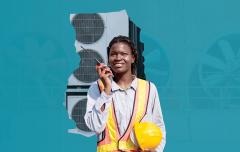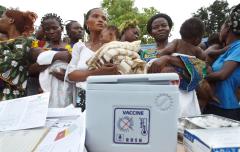Rachel Kyte addresses World Bank conference on cooling
The world needs to take a systematic, multifaceted approach to solving the problem of delivering cooling access to the more than one billion people who do not now have it, Rachel Kyte, CEO of Sustainable Energy for All (SEforALL) and Special Representative of the UN Secretary-General, told the opening session of the International Conference on Sustainable Cooling hosted by the World Bank Group in Washington, D.C on November 28.
Kyte said that global attitudes had evolved on the cooling issue, which was once dismissed as a luxury issue because it was seen primarily in terms of providing cooling comfort. There is now growing recognition that cooling access has become a development issue because the lack of cooling can cause enormous wastage of food supplies and medicine, while exposing large segments of the world’s population to the hazards of extreme heat waves.
“It’s remarkable that this [issue] isn’t seen in the round,” said Kyte, who added that cooling access amounts to an issue of equity that reflects the goal of “leave no one behind” under the Sustainable Development Goals, while it also pertains to the achievement of the Paris Agreement and the Montreal Protocol.
As one example, Kyte cited data from the recent SEforALL report, Chilling Prospects, that 20% of vaccines and 25% of temperature-sensitive medicines go to waste due to the lack of cold chains. This endangers the lives of millions of people.
Kyte’s sentiments were echoed by another lead speaker, Toby Peters, a professor at the University of Birmingham in the UK, who acknowledged that the cooling issue had long been “a blind spot” in the development agenda.
That may no longer be the case judging from the full capacity audience of representatives from government, the private sector, financial institutions and international organizations that attended the event at the World Bank headquarters. “I would never have imagined we would see this much interest when I first focused on the issue eight years ago,” said Kurt Shickman, executive director of the Global Cool Cities Alliance.
The World Bank hosted the three-day conference to gather opinions from experts as it develops over the next year an intervention roadmap on improving cooling access. Kyte, a former World Bank vice president, said that the group had an important role to play in several areas.
The World Bank could provide critical analytical support in identifying cooling access gaps around the world since it is difficult to determine who is most at risk without more data. This data could be used to support the planning of national cooling strategies, such as that being conducted in India.
The participation of the World Bank would help streamline the deployment of resources and remove obstacles that impede the achievement of cooling for all by the SDG deadline of 2030.
The World Bank should also incorporate cooling considerations in its strategic planning, particularly in the areas of health and agriculture, while offering financial solutions to help close cooling access gaps.
One crucial area is technology innovation, which emerged as a key topic at the conference. Kyte noted that as the world grows warmer, demand for cooling will increase and add to energy loads. This problem could be exacerbated by the fact that 2.3 billion people with limited incomes are expected to acquire air conditioners that are inefficient, which would consequently boost greenhouse gas emissions.
This so-called “captive carbon” population must have access to more efficient cooling systems. But the world cannot wait for technological advances to deal with the problem, she said. There are immediate steps at hand to help address the cooling access problem, such as painting roofs white under “cool roof” programs and introducing minimum energy performance standards for cooling devices.




